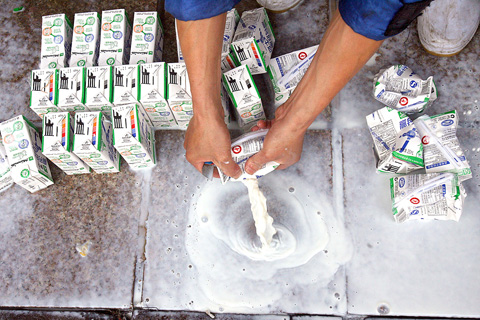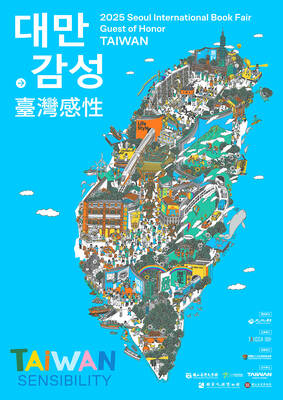A south China city is considering using milk at the center of a poisoned food scandal to make bricks as a cheap and clean way of disposing of the tainted products.
Guangzhou officials are looking into the viability of dumping the toxic products, found to have been tainted with the industrial chemical melamine, into furnaces that make bricks and cement.
City officials are having a hard time ensuring the milk is disposed of properly. Some Guangzhou garbage stations poured tainted milk into rivers earlier this month, triggering concerns the city’s water supply would be contaminated.

PHOTO: AFP
Using the milk products in the manufacturing process is estimated to cost 700 yuan (NT$3,369) for each ton of milk processed, more than 70 percent cheaper than burning it in garbage incinerators, media reports said.
The reports said that burying the poisoned products was another alternative allowed by the government, at a cost of 200 yuan a ton, but quantities would have to be limited to prevent soil pollution.
In China alone, four children have died and 53,000 have fallen ill after consuming milk or milk products laced with melamine, which can make the protein content appear higher.
Many countries and territories have banned Chinese milk and milk products in the wake of the scandal, one of many involving tainted Chinese-made foods. (AFP)
中國南方一個城市正考慮將這次有毒黑心食品的主角:毒奶拿來製造磚塊,因為這樣處理污染產品既省錢又環保。
廣州政府正在研議將這些遭工業化學品三聚氰胺污染的有毒產品傾倒至熔爐,製成磚塊和水泥的可行性。
市府官員正辛苦地向民眾擔保,會妥善處理毒奶。本月稍早,部份廣州垃圾場把毒奶直接傾倒入河,引發民眾擔心該市水源供應也會遭受污染。
媒體報導,每公噸毒奶進行加工處理的費用,預估是七百元人民幣(新台幣三千三百六十九元),比送到垃圾場焚化爐銷毀便宜七成以上。
報導指出,掩埋毒奶是中國政府核准的另一個替代方案,每公噸需花費兩百元人民幣,但為避免土壤污染,須限制掩埋量。
光是在中國,因食用含有三聚氰胺的牛奶或乳製品而死亡的孩童已有四名,另有五萬三千人出現身體不適的症狀。三聚氰胺能讓蛋白質含量增加。
隨著這起醜聞的爆發,許多國家和地區都已禁止中國的牛奶和乳製品進口;毒奶只是眾多中國製有毒食品之一。
(法新社�翻譯:袁星塵)

The 2025 Seoul International Book Fair was held from June 18 to 22 at the COEX Convention & Exhibition Center in Seoul, South Korea. This year, participants from 17 countries attended, with over 530 publishing houses and related organizations taking part. For the first time, Taiwan participated in the book fair as the Guest of Honor, bringing together more than 85 publishers and presenting a curated selection of 550 titles. A delegation of 23 Taiwanese creatives traveled to Seoul to attend the event, including 13 literary authors, six illustrators, and four comic book artists, among which were a film director, an

In late 2024, the suicide of acclaimed Taiwanese author Chiung Yao at 86 sparked a societal debate. She expressed her desire to avoid the difficult aging process and sought to govern her own death rather than leave it to fate. Her statements propelled the issue of “euthanasia” back into the public arena, posing the question of whether Taiwan should legalize euthanasia to grant patients and the elderly the right to die with dignity. Euthanasia, the intentional ending of a life to relieve suffering, is legal for humans in countries like the Netherlands and Belgium but remains prohibited in Taiwan.

A: Wow, the 36th Golden Melody Awards ceremony is set for this weekend. B: I like all the nominees for Best Mandarin Album: Incomplete Rescue Manual by various artists, Outcomes by J.Sheon, Invisible Color by Terence Lam, The Dreamer by Khalil Fong, Haosheng Haochi by Trout Fresh and Ordeal by Pearls by Waa Wei. A: Despite struggling with serious illness, Fong managed to finish his last album before he died. B: With his hit Twenty Three, he is also nominated for Best Song, Lyricist and Composer, and will receive a Special Jury Award for his album. A: And

1. 聽了這話,那人笑說:「你弄錯了。」 ˇ On hearing this, the man said, laughing, “You are mistaken.” χ On hearing this, the man said, laughing, you are mistaken. 註:you are mistaken 是主詞 the man 說的話,並非別人複述或轉述 the man 的話,應作直接引語而加引號。 2. 她說她很高興認識我。 ˇ She said that she was glad to meet me. ˇ She said, “I am glad to meet you.” χ She said that “she was glad to meet me.” 註:間接引語不用引號,引號只用於直接引語。 3. 她問他,喜不喜歡跳舞。 ˇ She asked him if he liked to dance. χ She asked him if he liked to dance? 註:一般疑問句變為間接引語時,用 if 或 whether 來引導。疑問句變為間接引語即間接問題時,句末不需用問號。 4. 他說我可以隔天再來。 ˇ He said that I could come the next day. χ He said that I could come tomorrow. 註:在間接引語中,如敘述者的地點和時間,與說話者的地點和時間不同,則時間副詞、地點副詞和指示代名詞要作相應的變動。如 tomorrow 改為 the